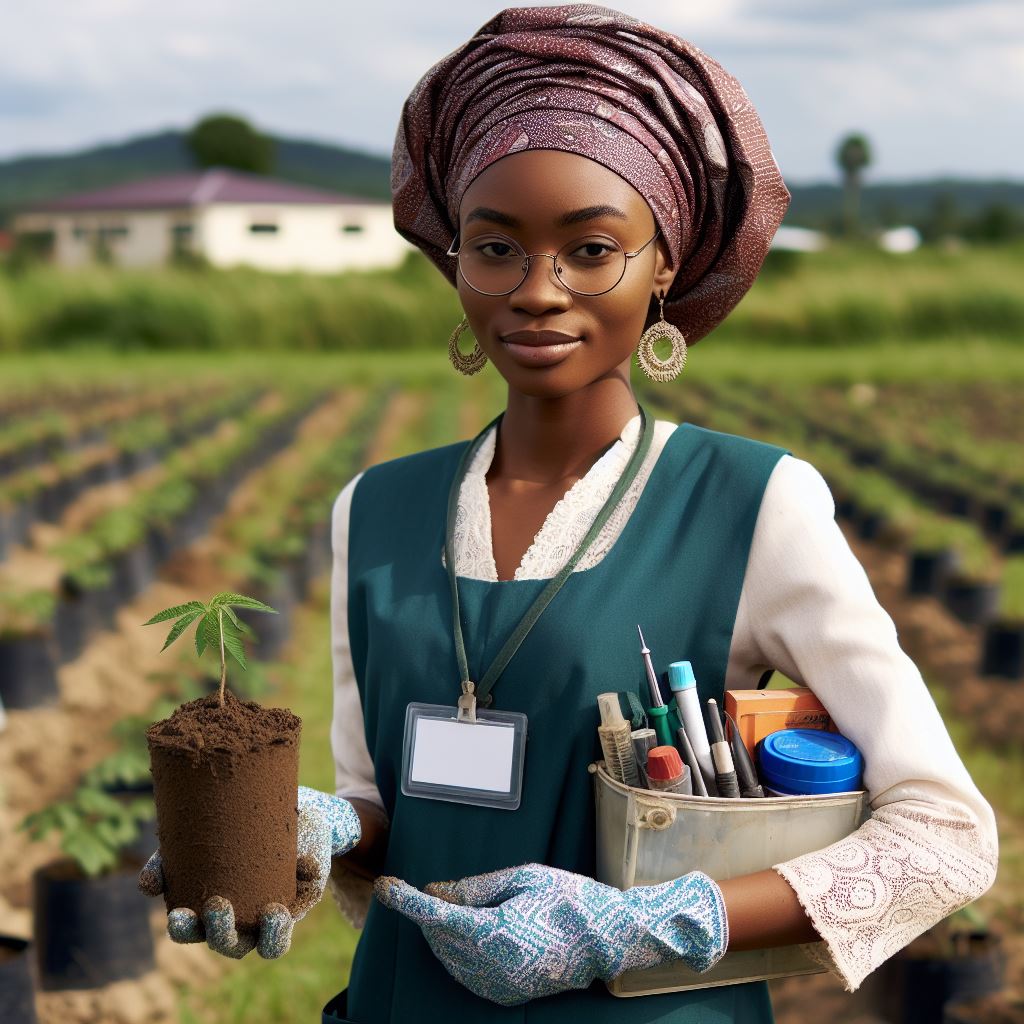Introduction
In this blog post, we will explore Real Life Crop Science Applications in Nigeria.
Crop science plays a vital role in Nigeria, ensuring food security and economic development.
The transition from classroom learning to real-life crop science applications is essential for practical farming.
Thesis statement: This blog post explores real-life crop science applications in Nigeria and how they bridge the gap between classroom education and practical farming.
The importance of crop science in Nigeria cannot be overstated
It is crucial for ensuring food security and promoting economic development in the country.
However, classroom learning alone is not enough to prepare future farmers for the challenges they will face in the field.
Real-life applications of crop science are necessary to bridge the gap between theory and practice.
In Nigeria, the transition from classroom to farm begins with hands-on training and practical experiences.
Students are exposed to real-life situations where they apply classroom knowledge to solve actual agricultural problems.
This experiential learning helps them develop the necessary skills and competencies to succeed in the field.
Real-life crop science applications enable students to understand the complexities of farming in Nigeria.
They learn about soil health, crop selection, pest management, and climate adaptation strategies.
These practical experiences enable students to tackle real-world challenges and make informed decisions in their farming practices.
Furthermore, real-life applications provide a platform for students to collaborate with farmers, researchers, and industry professionals.
By working together, they can exchange knowledge, share best practices, and develop innovative solutions to agricultural problems.
This collaboration strengthens the relationship between academia and the agricultural sector, promoting sustainable farming practices in Nigeria.
In essence, real-life crop science applications play a significant role in bridging the gap between classroom education and practical farming in Nigeria.
By providing hands-on experiences, students gain the skills, knowledge, and confidence needed to excel in the field.
Moreover, these applications foster collaboration among different stakeholders, leading to sustainable agricultural practices and ensuring the future success of Nigeria’s farming sector.
Importance of Crop Science in Nigeria
Brief introduction to the significance of agriculture in Nigeria’s economy
Agriculture plays a crucial role in Nigeria’s economy, contributing significantly to the country’s GDP and serving as a means of livelihood for millions of people.
With a vast amount of arable land and a climate suitable for crop cultivation, Nigeria has the potential to become a major player in the agricultural sector.
However, in order to maximize this potential and ensure sustainable agricultural practices, the importance of crop science cannot be overlooked.
Role of crop science in enhancing agricultural practices
Crop science encompasses a range of disciplines, including genetics, plant physiology, soil science, and agronomy, among others.
These disciplines work together to improve agricultural practices, increase crop yield, and promote food security.
By understanding the biological processes and interactions within plants, crop scientists can develop strategies to combat pests and diseases, optimize nutrient uptake, and enhance crop cultivation techniques.
One of the primary benefits of crop science is its ability to address the specific challenges faced by Nigerian farmers.
By conducting research and developing tailored solutions, crop scientists can help farmers overcome issues such as low crop productivity, soil degradation, and climate variability.
For example, through the use of advanced breeding techniques, crop scientists can develop high-yielding and disease-resistant varieties that are well-suited to Nigeria’s agroecological conditions.
The need for practical applications of crop science knowledge
However, to truly harness the potential of crop science, practical applications of knowledge are essential.
While research studies and laboratory experiments provide valuable insights, they must be translated into on-ground practices that farmers can readily adopt.
This requires effective knowledge dissemination and the provision of extension services to ensure that farmers are aware of and can utilize the latest scientific findings.
Furthermore, practical applications of crop science can also lead to improved agricultural sustainability.
By implementing practices such as conservation agriculture and precision farming, farmers can minimize resource wastage, reduce environmental impact, and increase long-term productivity.
Crop science plays a crucial role in promoting such sustainable practices by providing evidence-based recommendations and guidance.
Moreover, crop science has the potential to drive agricultural innovation and economic growth.
As new technologies and advancements emerge, such as genetically modified crops and precision agriculture tools, crop scientists can facilitate their adoption and integration into Nigerian farming systems.
This, in turn, can lead to increased productivity, improved food quality, and expanded market opportunities.
In fact, crop science is of utmost importance in Nigeria’s agricultural sector.
It not only enhances agricultural practices but also addresses the specific challenges faced by Nigerian farmers.
By promoting practical applications of knowledge, crop science can help drive agricultural sustainability, spur innovation, and contribute to the country’s economic development.
Transform Your Career with Expert Guidance
Get personalized mentorship consulting that’s tailored to your unique path. Our expert advice is actionable and exclusive.
Get StartedTherefore, it is crucial to invest in crop science research, extension services, and capacity building programs to support Nigeria’s agricultural transformation.
Read: Top Universities in Nigeria for Environmental Management
Classroom Learning in Crop Science
When studying crop science, students are initially exposed to theoretical concepts that form the foundation of their understanding in this field.
These classroom sessions provide a crucial basis for further practical applications in the real world.
Let’s delve into what students learn and how it prepares them for real-life crop science applications.
Explanation of Theoretical Concepts Taught
Crop science classes cover a wide range of theoretical concepts that are essential for understanding the intricacies of plant growth, agriculture, and crop production.
These concepts help students develop a solid foundation of knowledge in this field.
Through lectures and discussions, students gain insights into the fundamentals of plant biology, soil science, genetics, and crop pests.
These theoretical concepts serve as building blocks for their practical applications, enabling students to make informed decisions in real-life scenarios.
Topics Covered in Classrooms
The topics covered in crop science classrooms are diverse and comprehensive, providing students with a broad understanding of different aspects related to crop production and management.
- Plant Biology: Students learn about the anatomy, physiology, and life processes of plants, including mechanisms of photosynthesis, respiration, and growth stages.
- Soil Science: Understanding soil properties, classification, and fertility is crucial in crop science. Students learn about soil composition, mineral content, and nutrient management techniques.
- Genetics: Crop improvement heavily relies on genetic advancements. Students explore genetic principles, breeding techniques, and the role of biotechnology in crop enhancement.
- Crop Pests: Learning about various pests, diseases, and their control measures is vital for effective crop management. Students acquire knowledge about identifying, monitoring, and controlling pests.
Emphasizing the Lack of Practical Experience
While classroom lessons provide a solid foundation, they have one inherent limitation – the lack of practical experience.
Students may grasp theoretical concepts, but without hands-on experience, it becomes challenging to apply that knowledge effectively.
Real-life crop science applications require students to encounter and solve complex challenges that go beyond the boundaries of a classroom.
Physical interactions with plants, soils, pests, and farmers allow students to understand the dynamic nature of agriculture and adapt their knowledge accordingly.
Therefore, to bridge this gap between theory and practice, educational institutions should aim to incorporate more hands-on experiences, field trips, and internships as part of the curriculum.
Practical exposure will enhance students’ ability to apply theoretical concepts to real-world scenarios and make informed decisions on farms.
Crop science classrooms serve as the stepping stone for students embarking on a career in agricultural sciences.
The theoretical concepts taught in these classrooms lay the foundation for practical applications in the real world.
Though classroom settings lack practical experience, students gain valuable knowledge in plant biology, soil science, genetics, and crop pests.
Understanding these core concepts empowers them to tackle challenges and contribute to the growth of the agricultural industry.
However, to fully prepare students for real-life crop science applications, it is crucial to incorporate practical experiences alongside theoretical teachings.
By doing so, we can ensure that future crop scientists in Nigeria possess the well-rounded skills required to address the ever-evolving challenges in agricultural practices.
Read: Incorporating Technology into Crop Science Education in Nigeria
Real-Life Crop Science Applications in Nigeria
Agricultural Research Centers and Institutes in Nigeria
Nigeria is home to several agricultural research centers and institutes that focus on crop science.
These institutions play a crucial role in developing innovative techniques and technologies for sustainable agriculture.
- The National Agricultural Research Institutes (NARIs) are government-funded institutions dedicated to agricultural research.
They conduct research on various aspects of crop science, including breeding, pest management, and soil health. - International Crop Research Institutes, such as the International Institute of Tropical Agriculture (IITA), collaborate with Nigerian research institutions to develop crop varieties resistant to diseases and pests.
- Universities with agricultural departments, such as the Federal University of Agriculture, Abeokuta, have research units that focus on crop science.
They conduct studies on crop physiology, genetics, and agronomy.
Collaboration Between Educational Institutions and Farmers
In Nigeria, there is a strong collaboration between educational institutions and farmers to address real-life crop science challenges.
This collaboration benefits both parties and contributes to the advancement of agricultural practices.
- Universities and research institutions provide training and extension services to farmers, helping them apply modern techniques and scientific knowledge to their farming practices.
- Field visits and farmer training programs are organized to facilitate the transfer of crop science knowledge from educational institutions to farmers.
- Farmers actively participate in research trials conducted by educational institutions, providing valuable insights and feedback on crop performance under different farming conditions.
Successful Projects Applying Crop Science Knowledge
There are numerous successful projects in Nigeria where students apply their crop science knowledge to real farming scenarios.
These projects highlight the practical applications of classroom learning.
- Integrated Pest Management (IPM): Students collaborate with farmers to develop IPM strategies that minimize the use of chemical pesticides and promote sustainable pest control practices.
- Crop Variety Testing: Students work with farmers to test and evaluate the performance of new crop varieties, considering factors such as yield potential, disease resistance, and market demand.
- Soil Health Management: Students conduct soil analysis and work closely with farmers to develop soil fertility management plans, promoting sustainable soil practices and optimizing crop productivity.
In short, Nigeria has a strong emphasis on real-life crop science applications, with agricultural research centers, collaboration between educational institutions and farmers, and successful projects where students can apply their knowledge to practical farming scenarios.
This integration of academia and agriculture is pivotal in driving sustainable agricultural practices and ensuring food security in Nigeria.
Field Trips and Internships
Field trips and internships play a crucial role in enhancing the learning experience of crop science students.
They provide opportunities for students to apply their classroom knowledge in real-life situations and gain practical skills that are essential for success in the field.
Here, we will explore the significance of field trips and internships, highlight some examples of educational institutions organizing field trips, and discuss the benefits of hands-on experience and exposure to real farming practices.
The Role of Field Trips and Internships
Field trips and internships serve as a bridge between theoretical learning and practical applications in the field of crop science.
While classrooms provide a solid foundation of knowledge, field trips and internships offer students the chance to witness firsthand how concepts are implemented and adapted in real-life agricultural settings.
They provide a holistic learning experience by immersing students in the practical aspects of crop production, including cultivation techniques, pest management, and harvesting methods.
Field Trip Examples
Educational institutions worldwide organize field trips that expose crop science students to a variety of agricultural practices.
For instance, students may visit local farms to observe crop cultivation techniques, learn about soil management, and gain insights into irrigation methods.
These field trips often include interactive sessions where students engage with farmers, agronomists, and other industry professionals, allowing them to broaden their perspectives and deepen their understanding of crop science.
In Nigeria, several universities and colleges organize field trips for their crop science students.
Students often visit research institutes, where they learn about the latest scientific advancements in crop production.
They also have the opportunity to visit commercial farms, where they can witness the application of modern farming technologies and interact with farmers who have successfully implemented sustainable farming practices.
Benefits of Hands-on Experience
Hands-on experience gained through field trips and internships offers numerous benefits to crop science students.
Firstly, it allows them to develop practical skills that cannot be acquired solely through classroom lectures.
By physically engaging in various farming activities, such as soil testing, crop monitoring, and pest identification, students learn to apply theoretical knowledge and develop problem-solving abilities.
Field trips and internships also expose students to real farming challenges and the importance of adaptability.
They learn to navigate unpredictable factors like weather conditions, pest outbreaks, or market fluctuations, which are crucial aspects of successful crop production.
These experiences enable students to develop resilience and critical thinking skills, preparing them to tackle real-world agricultural problems once they enter the workforce.
In addition, hands-on experiences during field trips and internships provide students with exposure to different farming systems and technologies.
They become familiar with innovative practices such as precision farming, organic farming, and hydroponics, which broaden their understanding of sustainable crop production methods.
This exposure to diverse farming approaches fosters creativity and encourages students to think outside the box when addressing agricultural challenges.
Field trips and internships are invaluable components of crop science education.
They serve as a bridge between classroom learning and real-life applications by allowing students to apply their theoretical knowledge, gain practical skills, and develop a deeper understanding of agricultural practices.
By organizing field trips and internships, educational institutions contribute to the holistic development of crop science students, preparing them for successful careers in the dynamic field of agriculture.
Read: Future Careers: Studying Environmental Management in Nigeria

Delve into the Subject: Pasture Management Workshops and Training in Nigeria
You Might Also Like: Top Livestock Management Apps for Nigerian Farmers
Crop Science Research and Innovation
Real-life crop science applications in Nigeria encompass innovative approaches to optimize soil fertility for staple crops like maize and cassava.
Ongoing Research and Innovation in Crop Science
Crop science research and innovation in Nigeria play a significant role in addressing the challenges faced by farmers, improving agricultural productivity, and ensuring food security.
Researchers and scientists are continuously working on innovative solutions to enhance crop production, increase yield, and combat diseases and pests.
Let’s take a closer look at some of the ongoing research and innovative solutions developed by crop science researchers in Nigeria:
Development of Disease-Resistant Varieties
- Researchers are actively involved in developing crop varieties that are resistant to various diseases.
- For example, in response to the devastating effects of cassava mosaic disease, scientists have developed disease-resistant cassava varieties.
- These varieties not only reduce crop losses but also contribute to improving farmers’ incomes.
Integrated Pest Management Techniques
- Integrated Pest Management (IPM) techniques are being researched and adopted to minimize the use of chemical pesticides.
- Researchers are exploring natural methods like biological control and crop rotation to manage pests effectively.
- By reducing reliance on chemical pesticides, farmers can minimize environmental pollution and protect beneficial organisms.
Climate-Resilient Crops
- Climate change poses a significant threat to agriculture, affecting crop production and food security.
- Crop science researchers in Nigeria are focusing on developing climate-resilient crops that can withstand extreme weather conditions.
- These crops have traits such as drought tolerance, heat resistance, and adaptability to changing climatic conditions.
Precision Agriculture and Digital Solutions
- In recent years, precision agriculture and digital solutions have gained momentum in Nigeria’s crop science sector.
- Researchers are leveraging modern technologies like drones, remote sensing, and data analysis to enhance farming practices.
- These innovations enable farmers to make informed decisions about crop management, irrigation, and fertilizer application.
Soil Health Improvement
- Soil health plays a crucial role in crop productivity. Therefore, researchers are focusing on improving soil fertility and health.
- They are exploring sustainable practices like organic farming, composting, and cover cropping to enrich the soil.
- By implementing soil health improvement techniques, farmers can achieve better yields and reduce dependence on chemical fertilizers.
The Importance of Research in Addressing Farming Challenges
Research in crop science is of paramount importance for addressing the challenges faced by farmers in Nigeria. Let’s explore why research is crucial:
Increased Agricultural Productivity
Research helps identify and develop technologies and practices that improve agricultural productivity.
Innovative solutions, such as disease-resistant varieties and precision farming techniques, enable farmers to achieve higher yields and better returns on their investments.
Pest and Disease Management
Through research, scientists can identify effective pest and disease management strategies.
Developing resistant crop varieties and implementing integrated pest management techniques help farmers combat pests and diseases, reducing crop losses and ensuring food security.
Climate Change Adaptation
Climate change poses significant challenges to agriculture.
Research plays a crucial role in developing climate-resilient crops and sustainable farming practices.
These adaptations help farmers cope with changing climatic conditions and ensure the continuity of agricultural production.
Sustainable Farming Practices
Research contributes to the development of sustainable farming practices.
By focusing on soil health improvement, reducing chemical inputs, and promoting organic farming, researchers enable farmers to adopt environmentally friendly practices that safeguard natural resources and protect ecosystems.
Economic Empowerment of Farmers
Research-based innovations not only enhance agricultural productivity but also contribute to the economic empowerment of farmers.
By implementing advanced technologies and exploring new markets, farmers can improve their income levels and livelihoods.
In general, ongoing crop science research and innovation in Nigeria are instrumental in addressing farming challenges, improving productivity, and ensuring food security.
Through the development of disease-resistant varieties, integrated pest management techniques, climate-resilient crops, precision agriculture, and soil health improvement practices, researchers are providing innovative solutions to support farmers and enhance sustainable agricultural practices.
Read: Fieldwork and Internships: Gaining Practical Experience in Nigeria
Find Out More: Training Programs for Nigerian Livestock Farmers
Impact of Real-Life Crop Science Applications
Real-life crop science applications have had a significant positive impact on agriculture in Nigeria, contributing to increased crop yields and improved farming practices.
The application of crop science knowledge has revolutionized the agricultural sector, transforming traditional farming methods into more efficient and sustainable practices.
Increased Crop Yields
One of the most significant benefits of applying crop science knowledge in agriculture is the increase in crop yields.
By utilizing scientific techniques, farmers are able to optimize plant growth and productivity.
This includes implementing appropriate crop selection, precision farming practices, and improved soil management.
For instance, the use of genetically modified crops, which are developed through crop science research, has shown remarkable improvements in yield potential.
Genetically modified crops are engineered to resist pests, diseases, and adverse environmental conditions, resulting in higher yields and reduced crop losses.
Improved Farming Practices
Real-life applications of crop science have also led to the adoption of improved farming practices.
Farmers now have access to advanced techniques and technologies that enhance their efficiency, profitability, and sustainability.
One example is the use of precision agriculture, which involves the precise application of inputs such as water, fertilizers, and pesticides based on the specific needs of each crop.
This targeted approach minimizes wastage and environmental impact while maximizing crop production.
Furthermore, crop science applications have led to the development of more effective pest and disease management strategies.
Farmers can now identify and address potential threats early on, preventing the spread of diseases and minimizing damage to crops.
Success Stories and Testimonies
Real-life crop science applications have produced numerous success stories and testimonies from farmers who have implemented these techniques.
These stories serve as powerful evidence of the positive impact of applying crop science knowledge in agriculture.
Farmers who have adopted crop science techniques have reported significant improvements in their yields, resulting in increased incomes and improved livelihoods.
They have also witnessed a reduction in production risks, as crop science applications provide them with the tools to mitigate potential challenges.
For example, farmers who have implemented precision agriculture have reported higher profitability due to reduced input costs and increased crop quality.
This has allowed them to expand their operations, invest in modern equipment, and improve their overall farming practices.
Real-life crop science applications have had a transformative impact on agriculture in Nigeria.
Increased crop yields, improved farming practices, and success stories from farmers all highlight the tangible benefits of applying crop science knowledge.
As the agricultural sector continues to evolve, the integration of crop science will play a crucial role in ensuring sustainable food production and empowering farmers for a better future.
Conclusion
Crop science plays a vital role in Nigeria, contributing to sustainable agricultural development and food security.
Real-life applications bridge the gap between classroom education and practical farming, ensuring that knowledge is effectively applied.
Collaboration between students and farmers is key in implementing crop science techniques for long-term success.
Crop science holds great importance in Nigeria as it is a critical factor in ensuring a stable food supply and sustainable agricultural development.
With a population that heavily relies on agriculture, it becomes necessary to have a strong understanding of crop science.
Real-life applications of crop science serve as a bridge between theoretical knowledge gained in the classroom and its practical implementation in the field.
By applying crop science techniques, farmers can improve crop yield, minimize losses, and adopt sustainable farming practices.
It is imperative for students to collaborate with farmers and industry experts to foster a symbiotic relationship, allowing for the exchange of knowledge and experience.
By working together, students gain practical insights into crop science applications, while farmers benefit from new research and innovative approaches.
By encouraging collaboration between students and farmers, the crop science community in Nigeria can strive towards sustainable agricultural development.
Students bring fresh perspectives and research findings, while farmers contribute their practical expertise and experience in handling crops.
Crop science plays a crucial role in Nigeria, ensuring food security and supporting sustainable agriculture.
The application of crop science knowledge in real-life farming situations helps bridge the gap between theory and practice.
Collaboration between students and farmers is essential for the effective implementation of crop science techniques and achieving sustainable agricultural development in Nigeria.




